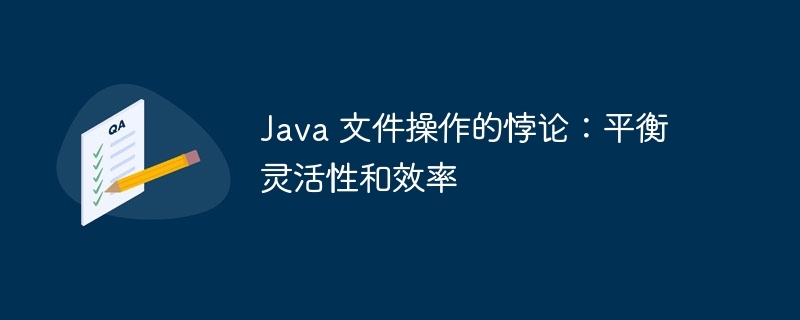Home >Java >javaTutorial >The Paradox of Java File Operations: Balancing Flexibility and Efficiency
The Paradox of Java File Operations: Balancing Flexibility and Efficiency
- PHPzforward
- 2024-03-21 10:01:07763browse

Java file operations have always been one of the challenges that developers need to face. Finding the best practice between flexibility and efficiency is something every developer needs to think about. This article will start from the perspective of Java file operations, explore the paradox between flexibility and efficiency, and provide you with some practical solutions. Let us follow PHP editor Zimo to delve into the mysteries of Java file operations!
Java NIO is a new I/O mechanism introduced by Sun Microsystems in Java 1.4 to provide higher performance and scalability. Nio provides non-blocking I/O operations, allowing applications to continue processing other tasks without waiting for the I/O operation to complete. This asynchronous processing method reduces thread overhead and improves concurrency processing capabilities.
advantage:
- Non-blocking I/O, improve high concurrencyperformance
- Efficient memory mapped file access
- Customizable buffer management
shortcoming:
- ProgrammingHigher complexity
- May cause additional memory overhead
Java BIO(Blocking I/O)
Java BIO is a traditional file I/O mechanism that uses blocking I/O operations. When an I/O operation is performed, the application thread blocks until the I/O operation is completed. This blocking processing method is simple and easy to use, but its concurrent processing capabilities are limited.
advantage:
- Easy programming
- Suitable for low concurrency scenarios
shortcoming:
- Blocking I/O, limiting concurrency
- Inefficiency, waste of thread resources
Apache Commons IO
Apache Commons IO is a third-party Java library that provides a wealth of practical tools for file operations. The library includes various functions such as file filtering, file copying, file comparison, etc. to simplify file manipulation tasks.
advantage:
- Rich practical tools to improve developmentefficiency
- Simple api, reduce programming complexity
shortcoming:
- There may be performance losses and dependence on third-party libraries
- Please pay attention to library version compatibility
Other considerations
In addition to the above technical solutions, there are some other factors to consider:
- File size: For small files, the performance difference between NIO and BIO is not significant. For large files, NIO's non-blocking features can be more advantageous.
- Concurrency requirements: If you need high concurrent processing capabilities, NIO is a better choice.
- Customization requirements: If highly customized file operations are required, NIO provides more flexible underlying control.
Weighing and Choice
When weighing these options, the specific needs of specific scenarios need to be considered. NIO is the first choice for scenarios that require high concurrency, customization capabilities, and high performance. For simple, low-concurrency scenarios, BIO is still reasonable. Apache Commons IO provides a rich set of utilities that can improve development efficiency, but performance overhead needs to be considered.
in conclusion
The paradox of Java file operations can be solved by weighing different technical solutions and choosing the optimal solution in specific scenarios. NIO provides efficient non-blocking I/O operations, BIO provides simple blocking processing, and Apache Commons IO provides rich utilities. By understanding the strengths and limitations of these options, efficient and flexible file manipulation procedures can be designed.
The above is the detailed content of The Paradox of Java File Operations: Balancing Flexibility and Efficiency. For more information, please follow other related articles on the PHP Chinese website!

